Book Review·Book Review|Criticism of "Subplot" (Part 1)
The red-crowned crane with a book in its mouth on the cover of "Subplot" broke into my heart. It's a very interesting cover. It is no longer a yellow and red color scheme, but with blue water. I like it very much. The credit is the artist Jo Zixuan.
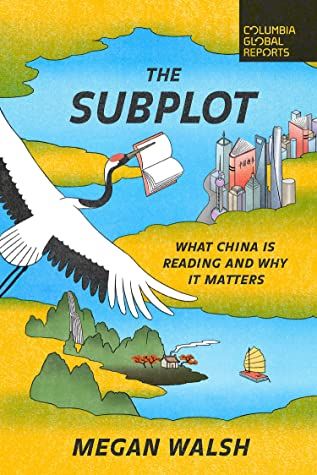
Subplot ("Subplot") opens the book with a sentence said by Xi Jinping at a conference of literary and art workers in 2014, and compared it with the conference of literary and art workers held by Mao Zedong in Yan'an in 1942. This is something I did not expect at all. . Don't like this feeling. It’s not that literature can’t be connected with politics, but I feel an inexplicable discomfort in my heart. It turned out that my discomfort seemed to be correct, so I won’t mention it here. I was still thinking about whether to continue reading this book, but before I knew it, I had read page after page. Maybe it has something to do with the insulting map in front of the catalog? Megan Walsh placed such a picture on the title page of "Subplot", as if to tell readers that the red-crowned crane on the cover of the book is flying to the place on the map with the book in its mouth. However, it is a pity that it would have been better if Walsh had indicated behind this picture where the book will cover. It’s not that she didn’t say it, but she said this——
"Works by writers from Taiwan, Hong Kong, and other Sinophone territories are not included in this book, for the simple reason that their authors in the last century have not been subject to the same political and historical experiences as those on the mainland."
Therefore, people from Taiwan, Hong Kong and other Chinese-speaking areas are not covered in this book, but what about Macau? The subtitle of the book is "What China is Reading and Why It Matters". So, how to define "China" here? People's Republic of China OR Republic of China? The author did not write clearly, but pointed out that Taiwan and Hong Kong were not included in the book. So, how to understand Taiwan? Where is Macau? What does other Chinese-speaking areas have to do with the "China" in the title of this book? Since the subtitle of the book says "China", then the other Chinese-speaking areas are Singapore, Malaysia, etc., so naturally they are not "China", so why mention it again?
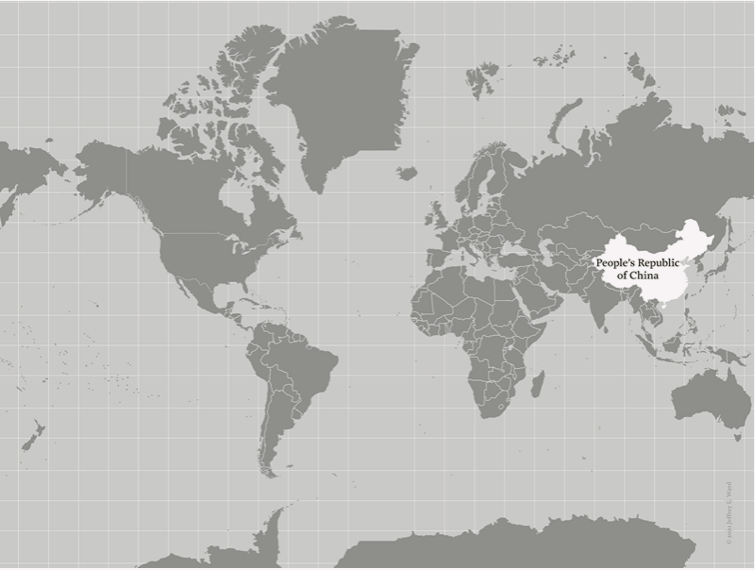
What "Subplot" wants to do is to be like a "Cihai" of contemporary Chinese literature, covering almost all imaginable and unexpected contemporary literary writers and works. This is well done. This book does not conceal any banned books, which is worthy of appreciation. At the beginning, the writer Yan Lianke's "Dingzhuang Dream" and later banned books by writers such as Ma Jian and Murong Xuecun were mentioned, and the plots of these books were briefly introduced and affirmed. Sometimes I regret that I have too little time and too many temptations in the world. I have not been able to sit down and read all these words one by one. It is precisely because of this that this book is particularly important.
Following Yan Lianke, author Walsh mentioned the general sensitivity of Chinese writers to the creative and censorship climate. In that paragraph, the author used "1984" that Pompeo quoted when he mentioned the re-education camps in Xinjiang. This is also the strange thing about this book. It makes people confused about the author's position. This does not mean that the author who writes such a "collection" must have a position. This is not a necessary requirement. However, it is difficult not to notice the feelings revealed between the lines in the book. For example,
Problem 1: Excessive use of “President Xi”.
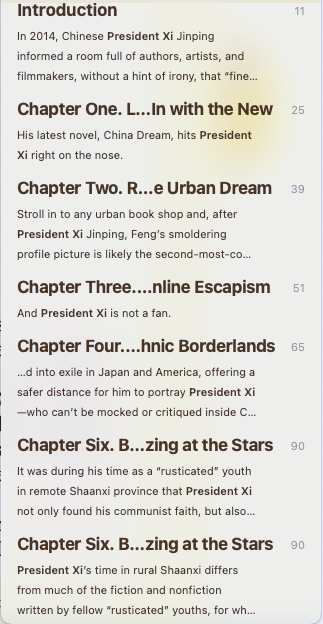
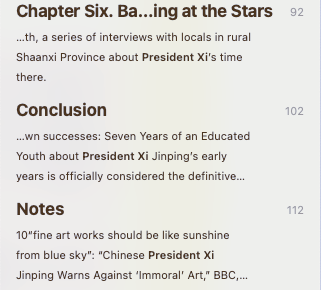
When I read the whole book, I felt that the whole book was full of "President Xi". This is a literary work, and to leave such an impression on readers would be the failure of the book. Of course, I also know that my feelings may not be accurate. Therefore, after reading the book, I searched for "President Xi" in the entire book. The search results only mentioned "President Xi" and used "President Xi" 10 times. Among them, as can be seen in the picture above, the author mentions "Chairman Xi" when referring to works involving the "Chinese Dream". At the same time, he also mentions "Chairman Xi's" experience of going to the mountains and countryside as an educated youth in Liangjiahe, but every mention is special. Use the title President. Will he never become the former President one day? Doesn't he have a name?
Question 2: "Chairman Mao"? ! Seriously? !
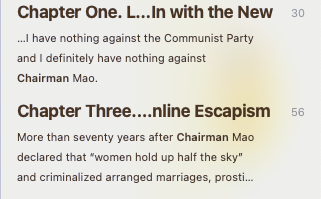
“More than seventy years after Chairman Mao declared that “women hold up half the sky” and criminalized arranged marriages, prostitution, child betrothal, and concubinage, young romance writers seem to go out their way to repeal equality for the purposes of storytelling.”
In this quote, the author also uses "Chairman Mao" instead of "Mao Zedong" when referring to Mao Zedong's words "women can hold up half the sky". Such a sentence reads very strangely. There is no need to elaborate on the evaluation of Mao Zedong. So, it really surprised me that such a non-academic but light science-like literary collection book called Mao Zedong so. Similarly, Chairman Mao also has his name. The above paragraph can be written as "more than seventy years after Mao Zedong announced that "women can hold up half the sky"..."
What I said before about pressing down is expressed here. In the postscript at the end of the article, the author thanks a number of well-known Chinese-English translators and authors for their help in learning Chinese and writing books. Do these people think this way of writing is OK? The review editor didn't propose any changes?
Myth.
Although "Subplot" does not write about the publishing industry in Hong Kong, it does write about the kidnapped bookseller in Causeway Bay; although President Xi calls out one after another, it also writes about Little Pinks and the writer's thoughts on the "Chinese Dream" and dreaming. , the banter and ridicule of sleepwalking; although it focuses on most literary works, it also pays great attention to "sensual literature", "rotten girls" and even the "Tianyi Case" that was sentenced to ten years in prison. Therefore, it is a myth.
Such a book could have allowed readers who love literature to find many books on contemporary Chinese literature to read, but it confuses readers because it repeatedly uses the above names and expressions when talking about the close connection between China's political landscape and literature. What a pity. Especially when there is a lack of in-depth discussion of a book, a story, or a plot, the accumulation of many "subplots" can easily make readers pay special attention to the political, historical and other backgrounds related to the "subplots", thus , which makes the narrative method of "Subplot" stand out, and also makes the above-mentioned way of calling it seem quite assertive. strangeness.
However, some parts still need to be praised, and I will mention them next time.
Like my work? Don't forget to support and clap, let me know that you are with me on the road of creation. Keep this enthusiasm together!




- Author
- More